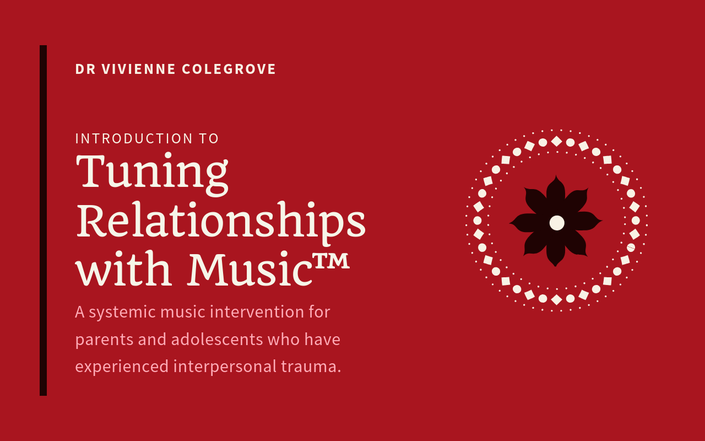
Tuning relationships with music
Working systemically to reduce conflict and restore relationships with families who have experienced trauma
Are you working with families who have experienced trauma?
Are you looking for strategies for working with these families to resolve relational conflict?
As you know, existing interventions that address parenting & relational difficulties for traumatised people have not proven to be very effective.
But Vivienne's recent research has proven that music therapy is effective for people with interpersonal trauma.
In this tutorial Vivienne covers:
- What are the effects of interpersonal trauma on parenting and relationships?
- What are the therapeutic frameworks currently being used to help traumatised people?
- How can music therapy help? What makes music therapy so effective?
Tuning relationships with music is an evidence-based model of working with families to assess parent-child conflict and work with improvisational models to improve non-verbal and verbal communication between traumatised parents and their children.
In this in-depth look at current research in interpersonal trauma Vivienne takes you through the effects of trauma on attachment and relationships, discussing theoretical frameworks and current methods used in trauma recovery.
Exploring the use of music to effectively resolve conflict affecting parents with interpersonal trauma Vivienne presents her 'Tuning relationships with music' recovery model and shows you how you can use this method with your clients.
As an experienced family therapist, counsellor and music therapist, Vivienne provides you with an evidence-based and effective model of working with families who have experienced trauma.
Your Instructor

Dr Vivienne Colegrove is a couple and family counsellor, and music therapist. She has many years experience working in mental health and trauma recovery services, and in private practice. She specialises in supporting individuals, couples and families to achieve relational healing where traumatic events have caused relationship wounds.
Vivienne draws on a range of evidence-based approaches, including the emotion coaching and emotion-focussed methods developed by John Gottman and Sue Johnson. When working with trauma, she adheres to the ISTSS Complex Trauma Treatment guidelines, drawing on additional techniques that attend to the unique neuro-physiological and relational challenges faced by those who have been exposed to family violence and/or childhood abuse.
Vivienne completed her PhD at the University of Melbourne. She also has a Masters degree in couple and relationship counselling and and a Post-graduate diploma in family therapy. Vivienne is a clinical member of the Psychotherapy and Counselling Federation of Australia.
Get started now!
Earn CMTE/CPD credits quickly and easily!
Watch the tutorial to earn 1 credit then earn 3 or more extra credits by completing the bonus content activities.
Course Curriculum
-
Preview1. Introduction, overview and learning outcomes (9:55)
-
Start2. What is known about challenges for families who have experienced interpersonal trauma? (10:18)
-
Start3. What works for families who have experienced interpersonal trauma? (10:11)
-
Start4. What are the mechanisms of change for families who have experienced trauma? (9:34)
-
Start5. Assessing parent-child conflict: Using music to assess non-verbal communication (11:48)
-
Start6. Tuning relationships with music: Core tasks, session outline and evidence base (10:12)
-
Start7. Summary, extra resources & bonus content (6:21)


Frequently Asked Questions
For music therapists from the US & Canada this tutorial can be submitted as a non-approved self-study option and covers the following CBMT Board Certified Domains:
I REFERRAL, ASSESSMENT, AND TREATMENT PLANNING
B Assessment - 1. 3d. 4 b. J. k. 7. 8. 9. 12. 13a. d.
C Interpret Assessment Information & Communicate results - 3.
D Treatment Planning - 2a. B. 4. 7. 9. 10. 11. 15. 16.
II TREATMENT IMPLEMENTATION AND TERMINATION
A Implementation
1. B. d. E. h.
2. a. b. c. g. H. i. k. l. m. q. S. v. x. y. aa. ac. ag. ah. aj. an.. ao.. aq. as. at. au. ax. . ba.
4. f. h. i.
5. a. g. m. r. t.. v.
III ONGOING DOCUMENTATION AND EVALUATION OF TREATMENT
A Documentation - 2.
B Evaluation - 1. 11.
IV PROFESSIONAL DEVELOPMENT AND RESPONSIBILITIES
A Professional Development - 2. 3. 6.

